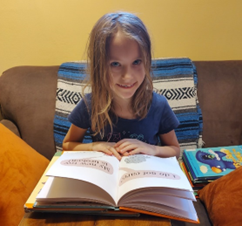Proficient reading ability is required in most professions and life in this country and world in order to be financially stable, pay bills/taxes, and avoid being scammed.
Unfortunately, too many adults are not as competent readers as they could be due to their early educational experiences. MANY misunderstandings prevail about how children learn to read, and the best ways to support proficient reading that emphasizes comprehension, not just decoding. Many children/tweens/teens are actually “fluent word callers.” They sound proficient when they read aloud. They decode with high accuracy and intonation that sounds fluent and expressive, yet they have very low comprehension and retention. When they are asked questions about what they’ve just decoded, they are unable to answer them accurately.
Most teachers, families and policy makers overemphasize decoding with reading instruction.
Reading involves thinking! To truly comprehend what one reads, readers:
– ask questions
– make connections (to their lives, other books/films/TV, to things in the world)
– visualize
– predict
– infer
– analyze
– and more.
To know if a child is deeply comprehending texts, it’s helpful to listen to them read and ask questions such as:
(With fiction:)
– Why do you think the character did/said that?
– How would you feel/react if you were in that situation?
– What do you think might happen next? Why do you think that?
(With informational text:)
– What did you learn about?
– What did it make you think of?
– What questions do you have about this topic?
When it comes to comprehension, most students aren’t as proficient as they could be.
Signs to look for to know if a child/tween/teen could benefit from a Reading Assessment & possible individualized reading support:
– Kids who avoid reading
– Kids who complain/whine about homework/having to read
– Kids who would rather play video games or text/be on social media than read
“My reluctant-reader 6-year-old looks forward to her bi-weekly reading sessions with Sarah! Her demeanor changes completely!” – parent of child tutored by Dr. Sarah
As with any skill, the more people practice the skill, the more proficient they become. The less likely they enjoy the activity, the less interested they will be to invest time and energy, enjoy it, and develop competency. Children/tweens/teens who avoid reading aren’t usually as proficient as they could be, and could greatly benefit from a little individualized support from a Reading Specialist.
If you’re uncertain about whether a student in your life might not be comprehending as well as they could/should be, I’d highly recommend beginning with a Reading Assessment, and then having a conversation with the Reading Specialist after the Assessment results are provided. Key to a child/tween/teen’s reading competency is their affect…how they feel about reading. Finding texts and topics of interest is critical. A Reading Specialist, or children’s librarian, can be very helpful.
Post written by Sarah Elizabeth, Ph.D., former Adjunct Professor of Literacy Education at NYU, Roosevelt University, Loyola University, and UIC, Reading Specialist and Tutor. For more information on her sliding scale for assessing/tutoring, please contact her at lifelonglearning312@gmail.com & visit: linktr.ee/lifelonglearning312
Content provided by Women Belong member Dr. Sarah Elizabeth











































 Introductions - Members Only
Introductions - Members Only Unleash Your Marketing Swagger: Crafting an Authentic Strategy for Customer Engagement
Unleash Your Marketing Swagger: Crafting an Authentic Strategy for Customer Engagement Women Belong Book Club
Women Belong Book Club Women Belong Book Club
Women Belong Book Club Harnessing AI to Boost Your Social Selling
Harnessing AI to Boost Your Social Selling